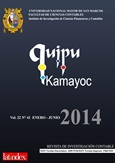ROLE OF CORRUPTION, ETHICS AND PUBLIC FUNCTION IN PERU
DOI:
https://doi.org/10.15381/quipu.v22i41.10069Keywords:
Official corruption, ethics, policy, public functionAbstract
The reasons that have led us to address this problem are cleartaking into account that corruption has a negative impact on consolidation of democracy and governance, also that subverts the guarantees of citi-zens, avoiding the respect for human rights and in civic ethics. Corruption are harmful practices that deserve an appropriate study of the problems and generates the appropriate legal mechanisms to control it. We can not, ignore the fact that in our country, corruption is perceived as a daily anomaly, a breach of the normal functioning of the institutions, even as facts themselves of national idiosyncrasies. This obviously affects public confidence in their institutions; also perverting public ethics, promoting lax moral and passive.This research makes proposals to combat such prac-tices in its various forms, because corruption distorts the minimum conditions of existence and the validity of the rules. Thus it is that we want to identify those negative effects that eventually lead to a pernicious attitude that is characterized by resignation, skepticism and cynicism about the legal framework and even at the idea of honesty as an indispensable value for the exercise of public functions.
Downloads
Downloads
Published
Issue
Section
License
Copyright (c) 2014 Jeri Gloria Ramón Ruffner de Vega

This work is licensed under a Creative Commons Attribution-NonCommercial-ShareAlike 4.0 International License.
AUTHORS RETAIN THEIR RIGHTS:
a. Authors retain their trade mark rights and patent, and also on any process or procedure described in the article.
b. Authors retain their right to share, copy, distribute, perform and publicly communicate their article (eg, to place their article in an institutional repository or publish it in a book), with an acknowledgment of its initial publication in Quipukamayoc .
c. Authors retain theirs right to make a subsequent publication of their work, to use the article or any part thereof (eg a compilation of his papers, lecture notes, thesis, or a book), always indicating the source of publication (the originator of the work, journal, volume, number and date).






